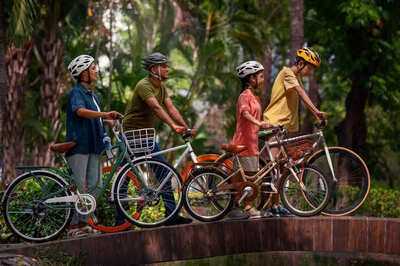 Travelers today want more than just sightseeing. They want to connect with nature in a way that is fun and also responsible. Active ecotourism offers exactly this. It includes activities like hiking, wildlife watching, and volunteering for conservation. This kind of travel helps preserve nature’s beauty while also benefiting the people who live there. In this article, discover what active ecotourism means, why it is important, and how to become a responsible ecotourist.
Travelers today want more than just sightseeing. They want to connect with nature in a way that is fun and also responsible. Active ecotourism offers exactly this. It includes activities like hiking, wildlife watching, and volunteering for conservation. This kind of travel helps preserve nature’s beauty while also benefiting the people who live there. In this article, discover what active ecotourism means, why it is important, and how to become a responsible ecotourist.

Responsible travel embracing nature and adventure
Active ecotourism is traveling to natural places and taking part in activities that are enjoyable but also kind to the environment. It means going beyond being a passive visitor and engaging in ways that protect wildlife, plants, and landscapes. This type of tourism supports sustainable adventure like hiking in national parks or swimming in protected coral reefs.
Adventure and care in nature activities
There are many ways to enjoy active ecotourism. Some common activities include:
Protecting nature, empowering local lives
Active ecotourism generates funds that help protect areas at risk of damage. It also creates jobs for local people, allowing them to earn money while preserving their environment and culture. This kind of tourism promotes respect for nature and local traditions, making sure everyone benefits.
Travel lightly, respect nature deeply
To protect nature, travelers should always follow rules set by parks and reserves. This means not littering, avoiding feeding or disturbing animals, and sticking to marked trails. Using eco-friendly products, supporting local businesses, and learning about the culture are also important steps. Responsible ecotourism keeps natural areas healthy for future visitors.
Global adventures protecting nature’s treasures
Many places lead by example in active ecotourism. Costa Rica has encouraged reforestation and wildlife protection with eco-friendly tours. Belize offers volunteer programs to protect rainforests. Indonesia supports coral reef conservation while providing eco-friendly snorkeling and diving trips. These destinations show how tourism can help, not harm, the natural world.
Begin sustainable journeys with mindful planning
Choose destinations known for eco-friendly tourism. Look for certified guides and tours that emphasize sustainability. Volunteer in conservation activities or support local artisans when you travel. Plan trips that combine fun with care for the environment and people.